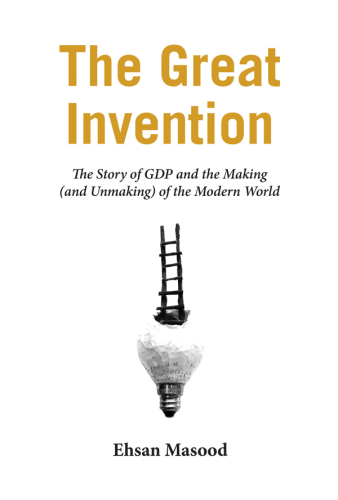
The Great Invention
The Story of GDP and the Making and Unmaking of the Modern World
کتاب های مرتبط
- اطلاعات
- نقد و بررسی
- دیدگاه کاربران
نقد و بررسی

March 28, 2016
Masood’s book might have been more accurately titled “The Not-So-Great Invention,” as he is clearly frustrated with the reliance on gross domestic product (GDP) as a measure of national prosperity. In lively prose, Masood argues that GDP is flawed because it ignores volunteering, housework, environmental degradation, job satisfaction, and income inequality. Relying on primary source materials and interviews, Masood names the economists who helped develop GDP. These include Simon Kuznets, who used a version of it in a report submitted to the U.S. Congress in 1933; John Maynard Keynes, who set down a formula for calculations in 1940; and Richard Stone, Keynes’s former assistant, who applied the formula to help the U.S. allocate Marshall Plan funds. Masood also explores the introduction, in 1990, of a rival measure, the human development index, though he concludes it “had zero effect on GDP itself.” Masood’s critique is interesting but not entirely convincing, particularly because it includes just one example—in 1960s Pakistan—of GDP gone awry. In the end, as Masood acknowledges, the change he seeks won’t come easily, because challenges to GDP may threaten to downgrade the perceived relative prosperity of the world’s most powerful nations. Agent: Peter Tallack, Science Factory (U.K.).

May 15, 2016
We all know that statistics can lie. But what about one of the greatest statistical measures of all, Gross Domestic Product?British science writer and BBC presenter Masood (International Science Policy/Imperial Coll. London; Science and Islam: A History, 2008, etc.) offers a provocation from start to finish, one that, though accessible to lay readers, will be most meaningful to those concerned with economic policy and development. GDP, he argues, is by the nature of its definition tilted to advanced economies, and it layers in hedges such as "effective demand" to condition tried-and-true formulas of the past. In the postwar era, he writes, the predecessor of the Organization for Economic Co-operation and Development pushed the use of the Depression-era GDP measure "as a system of accounting to assure richer nations that the assistance they were providing under the Marshall Plan wasn't being misspent and was contributing to the growth of economies." The problem, as development economists such as Mahbub ul Haq have argued, is that GDP doesn't account for aspects of the unofficial economy that are so important in developing countries, such as barter and job sharing. Neither does it account for externalities such as the value of available clean water, bringing the concept of GDP under criticism from environmental activists as well as economists. Masood examines the history and evolution of GDP, which seems to have the overall effect of making rich nations seem richer and poor nations poorer than they actually are and which therefore makes rich nations resistant to modifying or dropping it as a standard. The author further considers alternate methods of gauging economic activity, such as ul Haq's Human Development Index and the so-called Gross National Happiness standard, which are useful in quantifying "job satisfaction, volunteering, friendships, or other kinds of life satisfaction that do not involve money." A welcome cross-examination of a concept that seems as natural as sunlight but that, like every other human construct, is shot through with both politics and flaws.
COPYRIGHT(2016) Kirkus Reviews, ALL RIGHTS RESERVED.

























دیدگاه کاربران